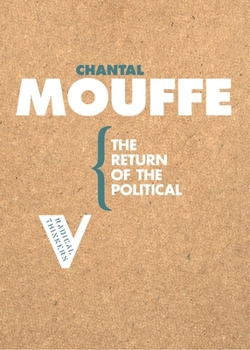Book Overview
In this work, Mouffe argues that liberal democracy misunderstands the problems of ethnic, religious and nationalist conflicts because of its inadequate conception of politics. He suggests that the... This description may be from another edition of this product.
Format:Paperback
Language:English
ISBN:1844670570
ISBN13:9781844670574
Release Date:January 2006
Publisher:Verso
Length:170 Pages
Weight:0.44 lbs.
Dimensions:0.6" x 5.2" x 7.8"
Age Range:18 years and up
Grade Range:Postsecondary
Customer Reviews
1 rating
Political Conflict (including identity politics) is necessary and Constitutive
Published by Thriftbooks.com User , 15 years ago
This is a tightly argued little book about politics, philosophy and the life of societies -- the unadorned variety of each. It is a broad critique of democratic pluralism (or liberal democracy, take your pick) -- one that sits somewhere comfortably near the opposite end of the pole of the optimism of Francis Fukuyama, in his "ode to democracy," called the "End of History." This author and the contributors to this volume, come to no such facile, arrogant, (or in this reviewer's view, erroneous) conclusion that because it is the best available to date (i.e., the last standing), democracy is somehow the end of history. Although this book only implies it, Fukuyama's thesis is built up on the shaky ground that because democracy is rational, universal, and individualistic it is also free, and of course this usually implies, that it is also free of conflict. In fact, using as her backdrop, the breakout of the ethnic and nationalistic strife that has occurred since the fall of Communism, Ms. Mouffe and her contributors, make the opposite argument, that not only are these things in the main untrue (or even irrelevant when they are true) about democracy, but also that the politics of conflict should be returned to the very center of both pluralism and democracy. These authors argue quite persuasively that it is a" return of the political" that is needed rather than a further reliance on rationality, universalism and (especially) individualism -- all of which are designed primarily, at best to manage; or at worse, to stifle conflict, rather than to promote its more constructive forms and elements. When democracy fails, conflict just assumes other guises and then is much more difficult to deal with. The illusion of consensus is more fatal to democracy than a direct challenge from a competing ideology. The collectively cogent arguments of these authors rest on the fact that in the end, everything is about identity. For not only is identity destiny, it is also existential and thus is seen as our primary reason for existing. One of the "take away messages" from the articles in the book is that "democratic pluralism," (or "liberal democracy") is but a euphemism for "European identity. " All identity then must thus be conceived of and seen for what it is: a dimension that is inherent to the human condition. Once this central point is understood, then it follows that conflict is also inherent in the affirmation of competing identities, especially collective identities. For the differences between "we" and "them," the very basis upon which identities are built, are interpreted in their negation of us by the proverbial "other," as a threat to our very existence. The misguided thesis by today's erstwhile "democrats:" that the world is orderly primarily because of Fukuyama's thesis that it is rational, universal and individualistic, and that democracy will hold under all conditions, in the end leaves little or no maneuver room for the "mother's milk" of polit




